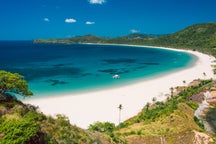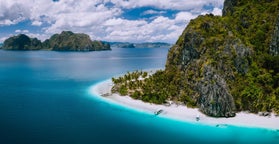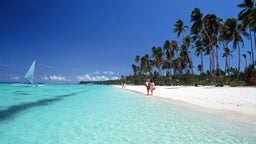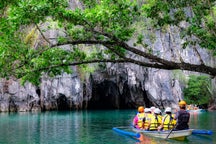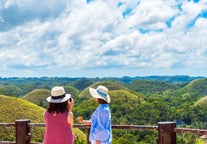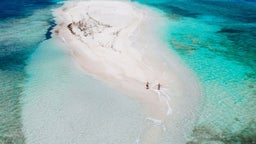Ilocos

As a region consisting of four provinces, the locals speak in different languages depending on where they live. However, the most popular languages are Ilocano, Pangasinan, and Tagalog. Many of the locals also understand English. In addition, residents are also known to be hospitable and friendly towards travelers who have come to visit and immerse in their culture.
Another important aspect of the region is religion as it has contributed heavily to the culture and even architecture of Ilocos. The majority of the residents subscribe to the Roman Catholic faith like most of the Filipino population. This is largely seen through the various churches built in the provinces, such as the historic Paoay Church in Ilocos Norte.
Best time to visit
Most of the top Ilocos tourist attractions and activities are best enjoyed without rain so it is recommended to plan your vacation to the region in the dry season. In the Philippines, the dry season begins in December and ends in June.
Cheapest time to visit Ilocos
If you want to visit Ilocos while enjoying lower hotel rates and airfare, it is best to visit in the rainy season, which spans from July to November. However, remember to monitor the weather closely during this season as strong storms are known to hit the Philippines during these months.
Weather in Ilocos
Similar to most parts of the Philippines, Ilocos experiences a tropical climate. This makes it a great tourist spot any time of the year, although it is still ideal to visit in the dry season to avoid any unwanted closures due to rainfall. If you would rather avoid the summer heat, you can also schedule your trip any time from December to February when the weather is usually cooler following and there are still fewer chances of rain.
Peak Season in Ilocos
Expect larger crowds in late December and Holy Week as these are the months when most Filipinos flock to the region for the holidays and long weekends. If you plan on visiting during these months, it is strongly recommended to schedule your trips in advance.
Main festival/events in Ilocos
Each province in the region has its own festivals that showcase its cultures. In Ilocos Sur, one of the most famous events is the Vigan Town Fiesta, a week-long celebration in honor of St. Paul the Apostle that starts on January 25. As for Ilocos Norte, its locals also throw a week-long fiesta for the Pamulinawen Festival. This event is held in Laoag every first week of February to honor the city's patron saint, Saint William. Meanwhile, the province of Pangasinan pays homage to their long-standing milkfish (bangus) aquaculture industry by throwing the Bangus Festival every April. Lastly, La Union puts on a 3-day celebration called the Sillag Festival every April. This event is held in Poro Point and honors the area's lighthouse that helps lead fishermen to safety.
When to avoid visiting Ilocos
To make the most of your trip to Ilocos, it is recommended to visit during the dry months and to avoid planning getaways to the region during the Philippines' typhoon season, which runs from July to November.
How to get to Ilocos
Land travel and plane travel are the best ways to get to Ilocos, depending on which province you plan on visiting. For Ilocos Sur and Ilocos Norte, you can take domestic flights to Ilocos Norte's Laoag Airport. As for Pangasinan and La Union, it is best to travel there by bus or via a private car.
If you're coming from Visayas or Mindanao, you will have to fly to Manila City first before taking another plane to Laoag or taking a bus to Pangasinan or La Union.
Safety in Ilocos
Ilocos has a low crime rate and is a generally safe area to visit. Despite this, it is still best to observe common safety practices such as watching your belongings while on your trip.
Getting around Ilocos
The best and most convenient way to get around the region is by hiring a private van or driving your own vehicle. Aside from these options, you can also ride tricycles and jeepneys to reach your destinations.
Food and Drinks
Ilocos is known as a popular food destination in the Philippines thanks to its local cuisine, which usually features bagoong (fermented/salted fish or small shrimps), fresh seafood, and vegetables. Among the region's most famous dishes are the Ilocos Empanada, Bagnet, and Pinakbet.
The Ilocos Empanada is made by mixing grated green papaya, mung bean sprouts, shredded carrots, whole egg, and skinless Vigan longganisa. The mixture is then wrapped with dough before being deep-fried until the dough becomes crispy. Bagnet, on the other hand, is pork belly deep-fried in its own fat until it turns crispy. Meanwhile, Pinakbet is made by mixing fresh vegetables with bagoong.
Best Neighborhoods to Stay in Ilocos
Ilocos boasts an impressive number of natural and historical attractions thanks to its rich culture. If you prefer immersing in heritage sites, it is best to find accommodations in Ilocos Sur’s Vigan City or in Ilocos Norte’s Laoag City. On the other hand, beach lovers will find various beachfront resorts in Pangasinan’s Bolinao town. As for surfing enthusiasts, you can find the best surfing conditions and surf schools in San Fernando town in La Union.


